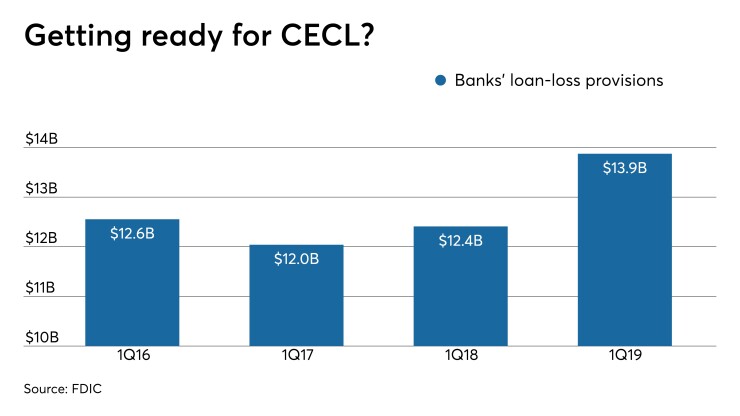Opponents of a new standard for recording loan losses are pressing the Financial Accounting Standards Board to go beyond its decision to delay implementation for most lenders.
FASB on Wednesday voted to give smaller lenders until January 2023 to adopt the Current Expected Credit Loss standard. FASB plans to issue a document, which will likely come out in mid-August, explaining the new effective dates, while creating a 30-day window for comments.
While bank and credit union advocates were pleased with FASB's decision to delay implementation for most lenders, they vowed to push for more concessions, including a repeal of the proposed standard.
“A partial delay without a requirement for study or reconsideration simply kicks the can down the road,” Rob Nichols, president and CEO of the American Bankers Association, said in a prepared statement. “It does not reduce the ongoing data, modeling and auditing requirements facing smaller banks or address the increased procyclicality it will cause.”

The ABA, which has endorsed legislation calling for delaying CECL until a quantitative impact study is conducted, called for an extension for all banks.
“We encourage Congress to act quickly to ensure this flawed standard is delayed for all institutions until such a comprehensive analysis can be completed,” Nichols said.
Officials at the National Association of Federally-Insured Credit Unions reiterated their call for credit unions to be exempted from the proposed standard.
“NAFCU will continue to advocate for credit unions to be exempt from this onerous and costly accounting standard as it could adversely affect credit unions’ capital levels immediately upon implementation,” Curt Long, the association’s chief economist and vice president of research, said in a statement.
"While the proposed one-year delay will help small credit unions come into compliance with this rule, the fact remains that CECL is a solution in search of a problem," Elizabeth Eurgubian, deputy chief advocacy officer and senior counsel at Credit Union National Association, said in another press release.
Adopted in June 2016, CECL has become a flashpoint in recent months, with detractors claiming it would divert capital away from lending and lead to longer, deeper recessions. Legislation in
For large banks that file with the Securities and Exchange Commission, conversion to CECL is expected to proceed as planned in January. Wednesday’s unanimous vote would delay implementation for smaller publicly traded banks, defined by the SEC as smaller reporting companies, as well as privately held banks and credit unions, until 2023.
FASB board member Hal Schroeder, who has been one of CECL’s biggest proponents, called the delay “a winning argument.” He added that the message from smaller financial institutions — that they needed more time to integrate and use data to make good business decisions — had come through loud and clear.
FASB Chairman Russell Golden said he decided in May to seek changes to the effective date.
“We’ve started to get input from private and smaller publicly traded companies that they would be more successful if they had more time to learn from the [larger] publicly traded institutions,” Golden said in an interview.
Golden said the decision to give smaller companies an extra year to prepare for changes is a fairly new approach for FASB. In this case, board members agreed to give them even more time to convert.
“These are major standards, difficult to implement” board member Gary Buesser said. “I think the extended learning curve will help these companies.”
FASB said it would launch a vigorous education and outreach effort to smooth the process of implementing CECL for smaller banks and credit unions. In addition to plans to consult with big banks, auditors and regulators, the board released an
In keeping with the new philosophy, the standards board also voted to delay the effective dates for recently approved standards on
CECL will require lenders to forecast and reserve for lifetime credit losses as soon as a loan hits their books. Currently, lenders are allowed to record a provision only when a loss is deemed imminent.





